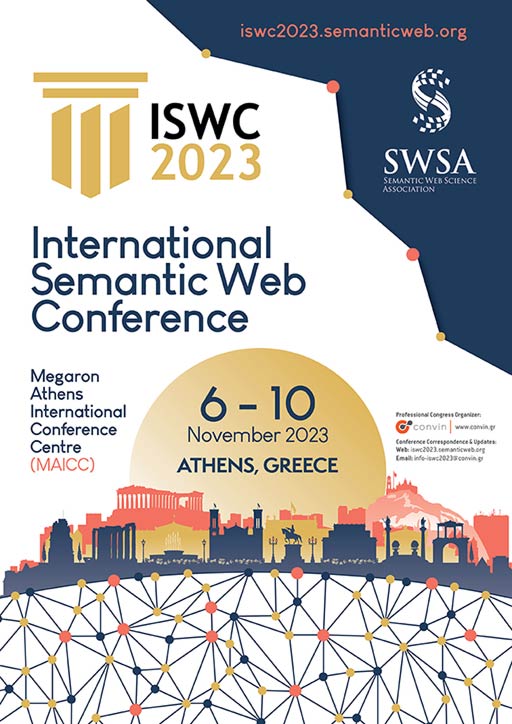Neuro-Symbolic AI Panel @ISWC’23
10:20 – 11:20, Τhursday, November 9 // Room: Banqueting Hall
Organizers: Efi Tsamoura1 and Vassilis Christophides2
Panelists: Antoine Bosselut3, Deborah L. McGuinness4, James Hendler5, Evgeny Kharlamov6, and Ioannis Tsamardinos7
1Samsung AI, Cambridge, UK
2ETIS, ENSEA, France
3EPFL, Switzerland
4Rensselaer Polytechnic Institute, USA
5Rensselaer Polytechnic Institute, USA
6Univ. of Oslo & Bosch
7University of Crete, Greece
The emerging paradigm of neuro-symbolic Artificial Intelligence (AI) stems from the recent efforts to enhance statistical AI (machine learning) with the complementary capabilities of symbolic AI (knowledge and reasoning). In neurosymbolic AI, symbolic knowledge is used to guide deep models, while offering a path toward grounding symbols and inducing knowledge from low-level sensory data. Neuro-symbolic AI aims to demonstrate the capability to (i) solve hard problems requiring cognitive capabilities (ii) learn with significantly fewer data, ultimately for a large number of tasks rather than one narrow task (iii) provide inherently understandable and controllable decisions and actions.
The success stories and the research challenges of neuro-symbolic AI are the main topics of a panel that will take place in Athens, in November 2023 as part of the 22nd International Semantic Web Conference (ISWC).
A few indicative questions for the panel are:
- What have been the main reasons for developing neuro-symbolic techniques, e.g., explainability, accuracy, or scalability?
- Are there any success stories of blending logic with neural models? Are there any killer application scenarios in the semantic Web, NLP, computer vision, or other areas?
- Is logic the right formalism to address the limitations of the neural models and vice versa?
- What are the main (foundational) problems involved in integrating deep learning with logic? Are uncertain logics the “glue” between these two paradigms?
- How important is understanding the human brain to develop effective neuro-symbolic techniques and vice versa?
- Do neuro-symbolic techniques relate to other AI paradigms like causal AI, hybrid AI and artificial general intelligence (AGI)?
- How logic can help to explain neural models?
Antoine Bosselut is an assistant professor in the School of Computer and Communication Sciences at the Ecole Polytechnique F´ed´eral de Lausanne´ (EPFL). Previously, he was a postdoctoral fellow at Stanford University and a Young Investigator at the Allen Institute for AI (AI2). He received his PhD at the University of Washington in 2020. He was named as a 2021 Forbes 30 under 30 for Science and Healthcare in Europe. His research focuses on building knowledge-aware NLP systems, specializing in commonsense representation and reasoning.
Vassilis Christophides (Organizer) is Professor of Computer Science at the Ecole Nationale´Sup´erieure de l’Electronique et de ses Applications (ENSEA). Previously,´ he worked as Professor at the University of Crete, as Senior Researcher at INRIA Paris and as Distinguished Scientist at Technicolor, R&I Center in Paris. He has published over 170 articles in high-quality international conferences, journals and workshops. He has received the 2004 SIGMOD Test of Time Award and the Best Paper Award at ISWC in 2003, 2007, and 2009, as well as, at the French National Conference in Databases (BDA) in 2021. He is currently heading the research team MiDi of the ETIS Laboratory in France and serving as an elected member the Executive Board (EB) of the EDBT Association. He is member of the ACM and IEEE.
Deborah L. McGuinness (Rensselaer Polytechnic Institute, USA) is the Tetherless World Senior Constellation Chair and Professor of Computer, Cognitive, and Web Sciences as well as Professor of Industrial and Systems Engineering at RPI. She is also the founding director of the RPI Web Science Research Center. Deborah has been recognized for her seminal work in explanation, knowledge engineering, ontologies, provenance, and methodologies for creating deployed applications. Her applications have touched a wide range of areas including precision health, exposure science, wireless spectrum, material science, as well as wine and food pairings, just to name a few. She is a fellow of the Association for the Advancement of Artificial Intelligence (AAAI), the American Association for the Advancement of Science (AAAS), as well as the recipient of the Robert Engelmore Award from AAAI for leadership in Semantic Web research and in bridging Artificial Intelligence (AI) and eScience, significant contributions to deployed AI applications, and extensive service to the AI community. She is also the recipient of the lifetime achievement award from the Knowledge Graph conference for outstanding contributions to the field of Knowledge Engineering.
James Hendler is the Director of the Future of Computing Institute and the Tetherless World Professor of Computer, Web and Cognitive Sciences at RPI. He also is acting director of the RPI-IBM Artificial Intelligence Research Collaboration and serves as a member of Board of the UK’s charitable Web Science Trust. One of the originators of the Semantic Web, he has authored over 450 books, technical papers, and articles in the areas of Open Data, the Semantic Web, AI, and data policy and governance. He is also the former Chief Scientist of the Information Systems Office at the US Defense Advanced Research Projects Agency (DARPA) and was awarded a US Air Force Exceptional Civilian Service Medal in 2002. In 2016, became a member of the National Academies Board on Research Data and Information, in 2017 a member of the Director’s Advisory Committee of the National Security Directorate of PNNL and in 2021 became chair of the ACM’s global Technology Policy Council. Hendler is a Fellow of the AAAI, AAIA, AAAS, ACM, BCS, IEEE and the US National Academy of Public Administration.
Evgeny Kharlamov is a Senior Expert at Bosch Center for AI and leads the Neuro-Symbolic AI topic at Bosch Research; he is an Associate Professor at the University of Oslo, where he is the scientific coordinator of the SIRIUS research center. Evgeny does AI-centered R&D on Semantic Technologies, Digital Twins, Ontologies, Knowledge Graphs and on their combination with Machine Learning. Evgeny’s work allows to enhance data and knowledge access, integration, exploration, and analytics and it is motivated by and applied to the context of Industry 4.0. His work led to 170+ publications at conferences and journals. Evgeny raised or participated in raising of about 4.7M EUR of research funding. He was in charge of several industrial collaborations of the Universities of Oxford and Oslo and of several large scale EU projects.
Ioannis Tsamardinos, is a Professor at the Computer Science Department of University of Crete, CEO and co-founder of JADBio (Gnosis Data Analysis PC), a University start-up. He obtained his Ph.D. from the Intelligent Systems Program at the University of Pittsburgh in 2001. Prof. Tsamardinos’ main research directions include machine learning, bioinformatics, and artificial intelligence. More specifically his work emphasizes automated machine learning, feature selection, and causal discovery. Prof. Tsamardinos has over 140 publications in international journals, conferences, and books. Statistics on recognition of work include more than 11000 citations (1100+ a year), and h-index of 43 (as estimated by Google Scholar). Ioannis has been awarded the European and Greek national grants of excellence, the ERC Consolidator, ERC Proof of Concept, and the ARISTEIA II grants respectively.
Efi Tsamoura (Organizer) is a Senior Researcher at Samsung AI, Cambridge, UK. In 2016 she was awarded an early career fellowship from the Alan Turing Institute, UK, and before that, she was a Postdoctoral Researcher in the Department of Computer Science of the University of Oxford. Her main research interests lie in the areas of logic, knowledge representation and reasoning, and neuro-symbolic integration. Her research has been published in top-tier AI and database venues (SIGMOD, VLDB, PODS, AAAI, IJCAI, ICML, etc.). Efi started the Samsung AI neuro-symbolic workshop series “When deep learning meets logic”.


